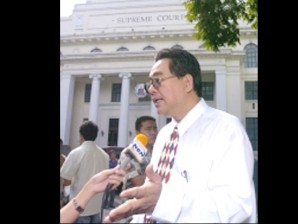MANILA, Philippines–The ad hoc committee on the Bangsamoro Basic Law (BBL) in the House of Representatives has pledged to approve a measure that conforms to the 1987 Constitution and is sensitive to the people’s will in the face of various local concerns.
“No unconstitutional provision will be included in the Bangsamoro Basic Law,” said committee chair Rep. Rufus Rodriguez of Cagayan de Oro City.
“We can’t just pass the bill we believe has provisions the Supreme Court will declare unconstitutional. We’re bound to uphold the Constitution,” he told the body on its last public hearing Wednesday.
Three of the original framers of the 1987 Constitution–Christian Monsod, Edmundo Garcia and Florangel Braid–attended the hearing, along with local executives from parts of Mindanao that would be affected by the creation of a new Bangsamoro political entity.
The three expressed support for the BBL, saying the creation of a self-governing Bangsamoro entity was one step toward lasting peace in the deeply divided region.
Garcia said BBL would provide for three transitions in Mindanao: from war to peace, from politics of exclusion to inclusive government, and from poverty and inequality to development and social justice.
Sulu Vice Governor Sakur Tan said the leaders of Sulu, Basilan and Tawi-Tawi were one in supporting the BBL, “provided that this will be cleansed.”
He raised a number of issues, including how the Moro Islamic Liberation Front would react should the Supreme Court strike down the law, or how the Moro National Liberation Front (MNLF), with its own factions and differing positions, would respond to the BBL should it be passed.
Zamboanga del Sur Gov. Antonio Cerilles also wondered why the committee was only talking to certain sectors even though other rebel groups such as the MNLF and the Bangsamoro Islamic Freedom Fighters were bound to be affected and to react to the passage of the BBL.
“What will happen to the local officials when the Bangsamoro transition council assumes office?” he asked.
Zamboanga City Mayor Maria Isabelle Climaco Salazar was unequivocal in opposing the inclusion of her city in the new Bangsamoro region.
She also said the question to ask in the plebiscite to determine the people’s acceptance of BBL should not be, “Do you approve of the Bangsamoro Basic Law?” but rather, “Are you in favor of being part of the Bangsamoro?”
